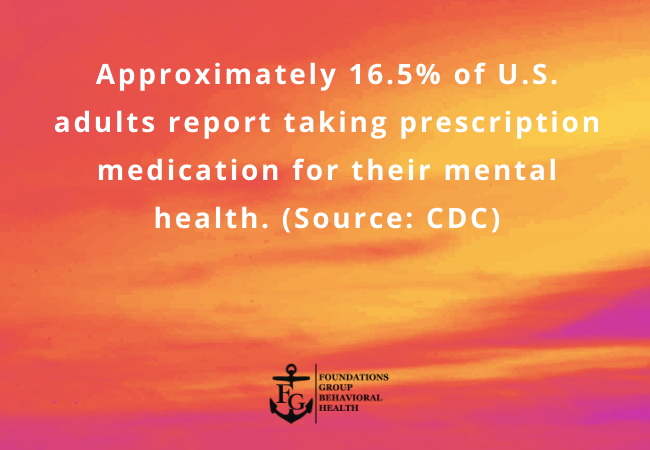Psychiatric medications can be a powerful tool in managing mental health conditions like anxiety, depression, and trauma-related disorders. When properly prescribed and monitored, they help restore balance and stability, making it easier to engage in therapy and enjoy daily life. But even when medications start off effectively, they sometimes need to be adjusted.
At Foundations Group Behavioral Health, we know medication management is not a one-and-done process. It requires ongoing evaluation and fine-tuning — especially as your body, mind, and circumstances change. Whether you’re in our Psychiatric Day Treatment Massachusetts, participating in our Half Day Treatment Program Massachusetts, or attending Outpatient Mental Health Therapy Massachusetts, it’s important to recognize the signs that your psychiatric medication may need a review.
In this comprehensive guide, we’ll help you understand the key indicators that it might be time for an adjustment, what to expect from the process, and how we support you every step of the way.
Understanding How Psychiatric Medications Work
Before diving into the signs of necessary adjustments, it’s helpful to understand how psychiatric medications function.
These medications work by influencing neurotransmitters in the brain, such as serotonin, dopamine, and norepinephrine, to improve mood, reduce anxiety, stabilize emotions, and ease intrusive thoughts. However, your brain and body are dynamic systems — they change over time due to factors like stress, sleep, nutrition, hormonal shifts, and life circumstances.
That’s why at Behavioral Health Treatment Center Massachusetts, we provide ongoing monitoring as part of our Mental Health Treatment Programs Massachusetts to ensure that your medication continues to meet your needs.
Common Signs Your Psychiatric Medication Might Need Adjustment
1. Return or Worsening of Symptoms
One of the clearest signs is the return of the very symptoms your medication was prescribed to manage. For example:
- Increased anxiety, restlessness, or panic attacks (often seen in patients of our Anxiety Treatment Program Massachusetts).
- Heightened feelings of sadness, hopelessness, or loss of interest (a concern for those in our Depressive Disorder Treatment Program Massachusetts).
- Flashbacks, nightmares, or intrusive thoughts linked to trauma (monitored closely in our Trauma Disorder Treatment Program Massachusetts).
If you notice a return or worsening of these symptoms, it’s crucial to speak with your provider promptly.
2. New or Uncomfortable Side Effects
While some side effects are expected in the first few weeks of starting or changing medication, new side effects appearing after stabilization may signal the need for a dosage adjustment or a change in medication. These can include:
- Digestive issues
- Excessive fatigue or insomnia
- Weight changes
- Sexual side effects
- Emotional numbness
At Foundations Group Behavioral Health, our expert providers track these concerns closely in programs like our Half Day Treatment Program Massachusetts to ensure your treatment is both safe and comfortable.
3. Emotional Numbness or “Flat” Feelings
While medications aim to stabilize mood swings, they should not make you feel emotionally numb or disconnected from your feelings. If you feel “flat,” detached, or like you’re just going through the motions, it could be a sign your dose is too high or the medication isn’t the right fit.
In our Outpatient Mental Health Therapy Massachusetts, we encourage open dialogue about emotional experiences, so we can adjust your treatment plan for emotional balance, not suppression.
4. Decreased Effectiveness Over Time
Over time, your body can build a tolerance to certain medications, especially if you’ve been taking the same medication for an extended period. You might notice:
- Increased anxiety or depression despite regular use
- Trouble concentrating
- Worsening sleep patterns
If this happens, our providers in Psychiatric Day Treatment Massachusetts work with you to safely adjust your treatment and explore alternatives if necessary.
5. Changes in Life Circumstances or Health
Your life circumstances directly impact your mental health needs. Major life changes such as:
- Pregnancy or hormonal shifts
- Significant weight changes
- High-stress events (divorce, job changes, grief)
- Other new medical diagnoses
These changes can alter how your body processes medication. At Behavioral Health Treatment Center Massachusetts, we consistently reassess your full health picture as part of our integrated Mental Health Treatment Programs Massachusetts to ensure medication remains effective.
6. Persistent Difficulty with Sleep
Sleep disturbances are both a symptom of mental health issues and a side effect of some psychiatric medications. If you experience:
- Trouble falling asleep
- Frequent waking during the night
- Excessive drowsiness during the day
… it might be time to reassess your medication. Sleep quality is a key focus in our Anxiety Treatment Program Massachusetts and across all our care pathways.
7. Suicidal Thoughts or Self-Harm Urges
Any increase in suicidal thoughts or self-harm urges is an urgent sign that medication may not be working as intended — or could be exacerbating symptoms. If you or a loved one experience this, seek immediate help.
Our teams in Psychiatric Day Treatment Massachusetts and Trauma Disorder Treatment Program Massachusetts prioritize crisis intervention and safety planning as part of our comprehensive care.

What Happens When Medications Are Adjusted?
At Foundations Group Behavioral Health, medication adjustments are done thoughtfully, collaboratively, and with your full involvement. Here’s what to expect:
- Comprehensive Review
We evaluate your symptoms, side effects, lifestyle changes, and treatment goals. - Gradual Changes
Dosage adjustments are made cautiously to minimize withdrawal symptoms or new side effects. - Close Monitoring
During transitions, we increase check-ins (available in all our programs, including Half Day Treatment Program Massachusetts and Outpatient Mental Health Therapy Massachusetts). - Therapeutic Support
Therapy remains central to your care. In our Mental Health Therapy Massachusetts, we help you manage emotions and expectations during medication changes.
The Role of Integrated Care in Medication Management
Medication is just one piece of the puzzle. Combining medication with therapy and holistic care provides the strongest foundation for long-term recovery.
Our integrated care model at Foundations Group Behavioral Health includes:
- Regular medication management and monitoring
- Individual and group therapy sessions for skill-building and emotional processing
- Lifestyle recommendations to support medication effectiveness (like nutrition, exercise, and stress management)
- Specialized tracks, such as our Depressive Disorder Treatment Program Massachusetts, Anxiety Treatment Program Massachusetts, and Trauma Disorder Treatment Program Massachusetts
This approach ensures that your medication supports your recovery — it doesn’t define it.
Why Choose Foundations Group Behavioral Health?
When it comes to psychiatric medication, finding the right balance matters — and that balance can shift over time. At Foundations Group Behavioral Health, we’re not just prescribing medications — we’re your partners in ongoing, compassionate care.
Here’s why Massachusetts trusts us for expert psychiatric medication management and therapy:
- Personalized, Expert Care
Our experienced providers specialize in adjusting medications safely and effectively. We personalize every treatment plan to your unique needs and goals, whether you’re in our Psychiatric Day Treatment Massachusetts or Outpatient Mental Health Therapy Massachusetts. - Integrated Therapy and Medication Management
We blend medication management with therapy to treat both the symptoms and root causes of mental health challenges. This holistic approach empowers sustainable recovery. - Ongoing Monitoring for Long-Term Success
You’re never left to navigate medication alone. Our Behavioral Health Treatment Center Massachusetts provides continuous oversight, regular check-ins, and timely adjustments as your needs evolve. - Specialized Programs for Every Diagnosis
From our Anxiety Treatment Program Massachusetts and Depressive Disorder Treatment Program Massachusetts to our Trauma Disorder Treatment Program Massachusetts, we offer tailored support for diverse mental health concerns. - Whole-Person Wellness Focus
We consider every aspect of your life in treatment planning — sleep, nutrition, stress levels, and more — to make sure your medication is working in harmony with your overall health.
Conclusion
Medication management is an evolving process. Even when medications start strong, changes in your body, life, or mental health can impact their effectiveness. Recognizing the signs early ensures you stay on the right path to recovery.
At Foundations Group Behavioral Health, our team is dedicated to walking alongside you. Whether you’re in our Psychiatric Day Treatment Massachusetts, Half Day Treatment Program Massachusetts, or Outpatient Mental Health Therapy Massachusetts, we provide compassionate, expert care at every stage of your journey.
If you’re noticing signs that your psychiatric medication may need adjustment, don’t wait. Call us today at 888.685.9730. We’ll help you explore your options and create a plan that supports your health and happiness. Together, we’ll help you find balance, stability, and renewed hope.
FAQ on Signs to Adjust Your Psychiatric Medication
How do I know if my psychiatric medication isn’t working anymore?
If your original symptoms return or worsen, or you develop new side effects, it might mean your medication needs adjustment. Our team at Foundations Group Behavioral Health provides thorough reviews in programs like Psychiatric Day Treatment Massachusetts to ensure your treatment stays effective.
Can I adjust my medication on my own?
No, it’s important to never adjust your medication without consulting your provider. Adjustments should always be supervised to prevent withdrawal symptoms or complications, which is why we offer expert management in our Half Day Treatment Program Massachusetts.
How often should psychiatric medications be reviewed?
Typically, medications are reviewed every few months, or sooner if you notice changes in symptoms or side effects. At Behavioral Health Treatment Center Massachusetts, we monitor patients closely as part of our Mental Health Treatment Programs Massachusetts.
Are medication adjustments common?
Yes! Adjustments are a normal part of psychiatric care. Your needs may change over time, and our goal is to ensure your medication remains effective and supportive.
Can therapy help reduce the need for medication changes?
Yes. Participating in therapy alongside medication, such as in our Outpatient Mental Health Therapy Massachusetts, can provide coping strategies and emotional support that enhance medication effectiveness and reduce the need for frequent changes.
What should I do if I feel emotionally numb on medication?
Emotional numbness can be a sign that your dosage may be too high or the medication isn’t the right fit. Talk to your provider immediately — we routinely assess these concerns in our Mental Health Therapy Massachusetts and Psychiatric Day Treatment Massachusetts programs.








